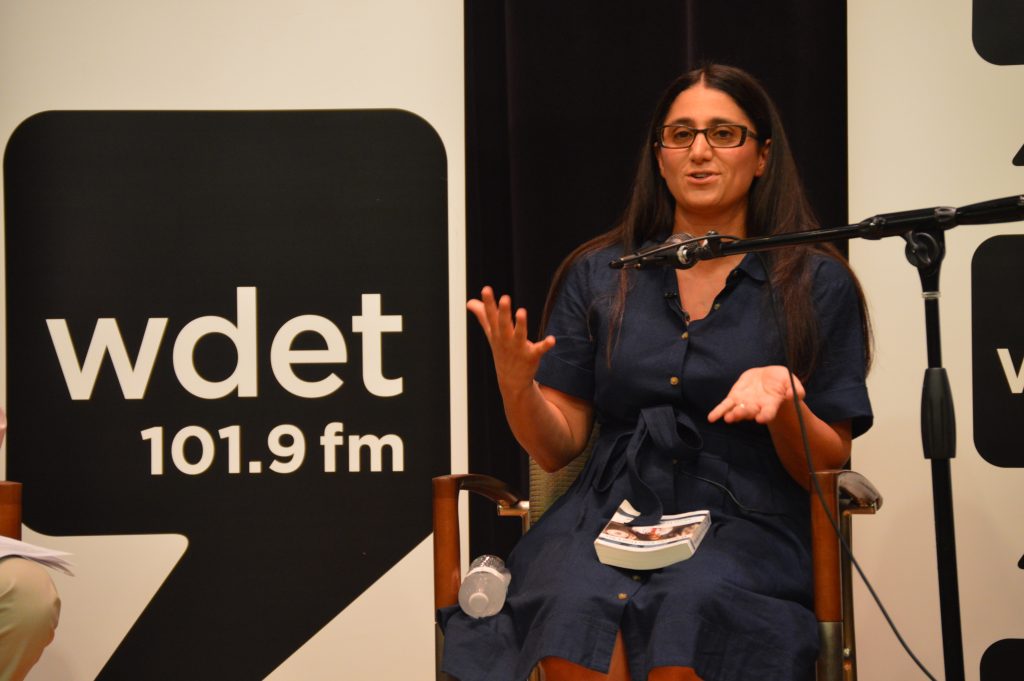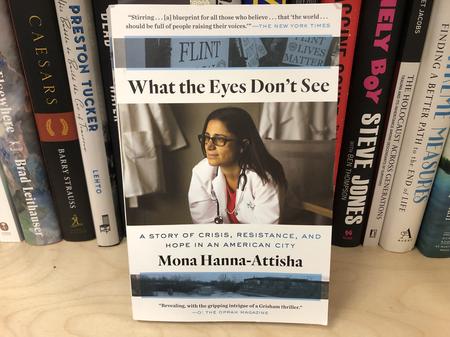Created Equal, Season 2: Warnings of a Crisis in Flint Go Ignored
In the first batch of episodes from “Created Equal,” four key figures in the early detection of a problem in Flint talk about their experiences.

WDET’s “Created Equal” Season 2 focuses on the Flint Water Crisis and the elected officials, health care and environmental experts, and citizens who were on the ground from the beginning.

The podcast season is a companion to the book “What the Eyes Don’t See,” written by Flint pediatrician Dr. Mona Hanna-Attisha, above, whose research showed Flint children had elevated lead levels in their blood after the switch. Listen to Ep. 1 where host Stephen Henderson about how disinvestment, poverty and emergency management created a crisis.
The Flint water crisis began in April 2014 when, under the authority of a state-appointed emergency manager, the city of Flint switched its water source from the Detroit Water and Sewerage Department system to water from the Flint River. Among the immediate consequences was brown smelly water flowing from taps into residents’ sinks.
But in early days, crucial warnings were ignored and concerns dismissed. In our first batch of episodes, four people who sounded early alarms about what was happening in Flint talk with host Stephen Henderson about their efforts to uncover the truth and the challenges they faced along the way.
Subscribe to Season 2 of “Created Equal” on iTunes, Stitcher, Spotify and stream the latest episodes below.
Guests
-
Mona Hanna-Attisha, is founder and director of the Michigan State University and Hurley Children’s Hospital Pediatric Public Health Initiative. A pediatrician, scientist, activist and author, Dr. Hanna-Attisha has testified twice before the United States Congress, awarded the Freedom of Expression Courage Award by PEN America, and named one of Time magazine’s 100 Most Influential People in the World for her role in uncovering the Flint Water Crisis and leading recovery efforts. She is the founding donor of the Flint Child Health and Development Fund.
-
Born and raised in Flint, Dan Kildee, Congressman for Michigan’s 5th District, serves as Chief Deputy Whip, part of the Democratic leadership team in the 116th Congress. Congressman Kildee serves on the Ways and Means Committee and he also founded Michigan’s first land bank – the Genesee County Land Bank.
-
Elin Betanzo is a life-long friend of Dr. Mona and worked for the EPA during the Flint Water Crisis. She is the person who told Dr. Mona there was something wrong with the water. She is the founder of Safe Water Engineering LLC, a consulting firm working to improve access to safe drinking water through engineering and policy consulting.
-
Curt Guyette joined the ACLU of Michigan in 2013. He is now their investigative reporter writing exclusively about issues involving emergency management and open government. In 2015, he helped produce a mini–documentary, “Here’s to Flint,” that led to a leaked memo from a U.S. Environmental Protection Agency official that explained how Michigan’s process for lead testing in Flint’s water delivered artificially low results.
Episode Guide
Ep. 2: Dr. Mona Hanna-Attisha
“There’s many long-standing causes that created the Flint Water Crisis, it wasn’t one person and one decision. It was a perfect storm of many issues: Disinvestment, racism, austerity, capitalism.” – Dr. Mona Hanna-Attisha
The Flint pediatrician and author of “What The Eyes Don’t See,” Dr. Mona Hanna-Attisha discovered elevated lead levels in children and blew the lid off of the Flint Water Crisis.
Ep. 3: Congressman Dan Kildee
“When we saw this decision to switch the water source to the Flint river. If you’re from Flint, it sounds like the punchline to a joke.” – Rep. Dan Kildee
Flint native and Congressman Dan Kildee first appears in “What The Eyes Don’t See” on page 131. In this episode, he details how the system failed the citizens of Flint, and his efforts to make Washington understand.
Ep. 4: Elin Betanzo, former EPA water expert
“Nobody is really going to pay attention that there’s lead in the water until there’s evidence that people are being harmed by it.” – Elin Betanzo
The long-time friend of Mona Hanna-Attisha and former EPA water quality expert, Elin Betanzo first appears in “What The Eyes Don’t See” on page 30. In this episode, she details how she suspected Flint water was not safe in spite of government reassurances — and how she spoke up.
Ep. 5: Curt Guyette, ACLU investigative reporter
“The question became: How do you get to what is going on conclusively? I proposed: Do our own tests.” – Curt Guyette, ACLU
Among the first journalists covering the Flint Water Crisis, Curt Guyette first appears in “What The Eyes Don’t See” on page 54. In this episode, he talks about going door-to-door searching for the truth about Flint water.
